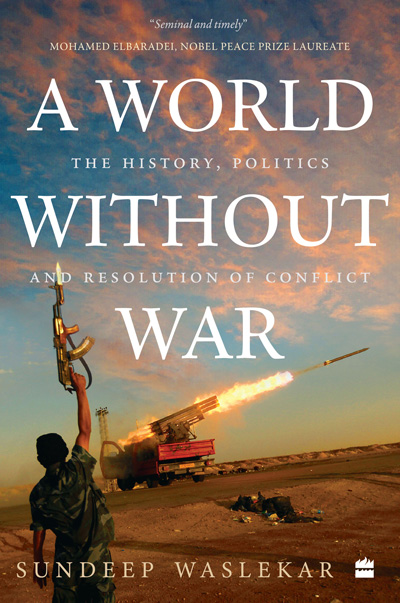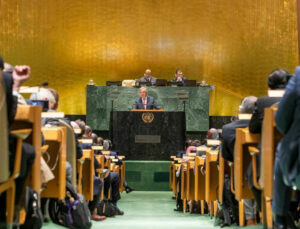
Supranational Institutions
A global social contract will require a supranational institutional architecture to express the general will of humankind. The supranational architecture should not be a representation of the system of states in any form. Presently, the United Nations (UN) member states nominate candidates to lead international organizations such as the main UN secretariat, WHO, World Trade Organization, Food and Agriculture Organization by lobbying for them. It is the same with regional organizations such as the Commonwealth, Organization for Security and Co-operation in Europe (OSCE) and regional development banks.
The UN sometimes appoints independent panels to address a specific issue for which it asks member states to nominate candidates. Once in the panel, the members are expected to function independently, but they subconsciously represent the interests of their home country. A panel on new threats to global security may focus on terrorism if there are members from the Western states, or on the expansion of the UN Security Council if they are from India or Brazil, but not on the threats posed by lethal autonomous weapons or killer pathogens. Thus, even though a UN panel may function independently, if its members are appointed by the sovereign states, its recommendations are likely to reflect the concerns of the nominating states. It is, therefore, necessary that the states have no nominating authority or representation in the supranational architecture embodying the global social contract.
RELATED
Hans Corell on UN Security Council Reform and the Rule of Law
On this episode of the Global Governance Podcast our guest Hans Corell urges the need to think creatively to enhance the effectiveness of the UN Security Council.
The supranational civilizational architecture thus created should engage with people around the world through various means of digital and direct communication. It should have powers to take decisions that are binding on the states, but these should only be confined to civilizational matters; it should not interfere in issues within the ambit of national governance. This new organization should also provide binding direction to the various associations of states, including the UN, on issues that may threaten the existence of human civilization. One of its major tasks should be to propose solutions based on compromise for conflicts between states so that there is no incentive to take recourse to arms.
Such an architecture can be the initial step for the transition to a global social contract. However, this should be conceived of in a creative way as it should not be mired in the current problems that plague our existing organizations, such as an excessive adherence to hierarchy; in any case today there are too many international organizations that do precious little to make any real difference in civilizational matters and adding to that tally will not make a difference. The new architecture can be a form of network that brings civilizational issues to surface in a dynamic process and pulls together the weight of the world’s public opinion on government leaders to implement solutions. It may be possible to use technology to achieve this aim, though there are dangers of the technology being misused by vested interests. It must be underpinned by the moral unity of the world’s people transcending national borders. The weight of such moral unity must be so significant that it can persuade powerful nation states to act for global good.
Parliamentary Organisation
Eventually, the people of the world need to unite and legislate through a world parliament. It would be a long and arduous process to conceptualize such a parliament independent of states. It should be more effective and different from the current Inter-Parliamentary Union (IPU), which is a federation of current parliaments operating with the principle of state representation. Its activities are governed by the Speakers of member parliaments, who are intrinsically linked with their national governments. It is common to see parliamentary representatives of many countries representing the views of their respective states in the IPU assemblies. The future world parliament must be based on a novel formula. If it is formed with nomination from the states, it would in effect become a platform for representing and negotiating states’ interests, and if it is formed as per population, it would be dominated by the most populous countries.
The European Parliament (EP), which is the only major multinational legislature, may inspire some ideas for the model of a world parliament. The EP membership composition is set out by the European Union treaties. The allocation of seats in the EP is not proportional to each state’s population, nor does it reflect any particular mathematical formula; however, it is stated in the treaties that the distribution of seats should be ‘degressively proportional’ to the population of the member states. This means that the smaller states receive more places on a pro rata basis than the more populous states. Other important questions will surface. For example, countries that have never experienced democracy and do not hold elections for their national legislature might not be willing to hold elections for a global one.
Justice and Conflict Resolution
Several civil society organizations have launched a campaign to create the UN Parliamentary Assembly. Many different formats of the proposed organization are under discussion. The easiest path would be the evolution of the IPU into a robust parliamentary body. Another option under discussion is the establishment of a subsidiary body under the UN General Assembly. But this option creates a hierarchy, giving primacy to the organization representing the states over the one representing people. The League of Nations had considered and rejected the proposal to create a People’s Assembly in the 1920s. It is possible that the UN might reject a similar proposal in this century to avoid a turf competition. Those committed to having people’s representation in global governance may have to contemplate other ways and means to pursue this objective.
The supranational organization to manage civilizational issues will also need an independent judicial organ. It is the perceived absence of justice that is at the root of violence. Justice ensures peace. And this is true at local, national, and global levels. When we consider justice in the context of civilizational survival, we must be certain of the protection of the world’s population from the scourge of a devastating war, or slow death from environmental, biological and technological mishaps, without any discrimination. This requires an effective mechanism for arbitration, conflict resolution and dispensation of justice.
This excerpt from Sundeep Waslekar’s ‘A World Without War’ has been published with permission from Harper Collins India.



